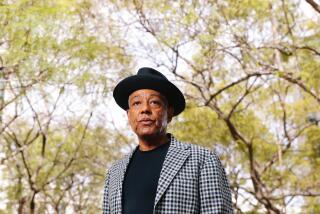Behind the Cameras at ‘FRANK’S PLACE’:
- Share via
TIM REID and Hugh Wilson concocted “Frank’s Place,” one of this season’s biggest hits, following an afternoon of tennis at Wilson’s house. They took their idea to CBS, and today they are the program’s co-executive producers. What makes their story unusual is that they succeeded despite avoiding the social circuit where deals are often made in Hollywood. And Reid is black, Wilson white.
“This is the most segregated town I’ve ever lived in,” says Wilson, whose soft drawl reflects his Southern upbringing. “But my experiences on this show reaffirm my suspicions that there are lots of qualified blacks out there. Sometimes we have to go that extra mile to find them, since they’ve previously been excluded.”
“Frank’s Place” became an integrating force. The show, set in New Orleans, falls into that newly touted category “dramedy”--serious subject matter spiced with comedy. It has the Northern-bred, black New England college professor, Frank Parrish, taking over the restaurant Chez Louisiane upon his father’s death. He is forced to change some of his Northern attitudes as he lives in Louisiana’s black community. And the New Orleans natives must re-evaluate their feelings about black Northerners. The show’s executives explain that it’s a carefully researched study of Southerners--both black and white.
Reid and Wilson became friends when they worked on “WKRP in Cincinnati,” which Wilson created. When “WKRP” was canceled, Reid became a regular on “Simon & Simon” as Downtown Brown; Wilson produced “Easy Street” with Loni Anderson. Neither of the men was looking for a new job, but they wanted to work together.
“Getting into a power position has been a dream of mine for years, especially after all the time I’ve spent in front of the camera,” says Reid. “Hugh is the type of person who promotes from within, and since he knew I wanted to get involved in production, we became equal partners and can equally effect change in this industry.”
While they were developing the series, both men made clear to the network and the production company that they planned to employ minorities. Today, the crew is more than half black, and Wilson has hired several black directors, including Roy Campanella II, Helaine Head, Stan Lathan and Neema Barnette.
“I’ve gotten a lot of support and encouragement, but the bottom line is, there’s always a problem when you’re doing a show about blacks with white people in control,” says Barnette, an Emmy-Award-winning producer whose writing was also nominated for an Emmy. “It’s almost impossible to get your foot in the door,” she says, “and once you do, I feel I have to speak up.
“For example, I directed an episode written by David Chambers, who’s white and from the Midwest, in which one of the characters says Reverend Deal (the black minister) would like to be Elvis Presley. I had to present a historical perspective of music and pull a bunch of strings to get it changed from Presley to Chuck Berry.”
Reid and Wilson divide the executive duties. Wilson writes the shows and handles personnel decisions, which must meet with Reid’s approval. On stage, Reid is in charge, but he longingly talks about script writing. Samm-Art Williams, a Tony Award nominee, is the show’s only black writer.
“If a black person has a problem with the script, he has it with me, not Hugh,” Reid says. “What Hugh doesn’t have in ‘black lessons’ he makes up for in sensitivity. He’d rather slit his throat or take out a word than offend someone. Several times, I’ve had to put a sentence back in because it wasn’t derogatory, although a black actor can quickly convince Hugh it is.”
“I’m probably more race-conscious than Timmie,” says Wilson. “Sometimes I’ll think some of our humor is slipping into an ‘Amos ‘n’ Andy’ routine, and I’ll mention it. Tim reminds me that they were often funny, and I’m being too sensitive.”
Reid and Wilson have a good marriage right now with the success of “Frank’s Place.” And both men have shown that they’re serious about using people who usually don’t get hired.-- G.B.
More to Read
The complete guide to home viewing
Get Screen Gab for everything about the TV shows and streaming movies everyone’s talking about.
You may occasionally receive promotional content from the Los Angeles Times.






